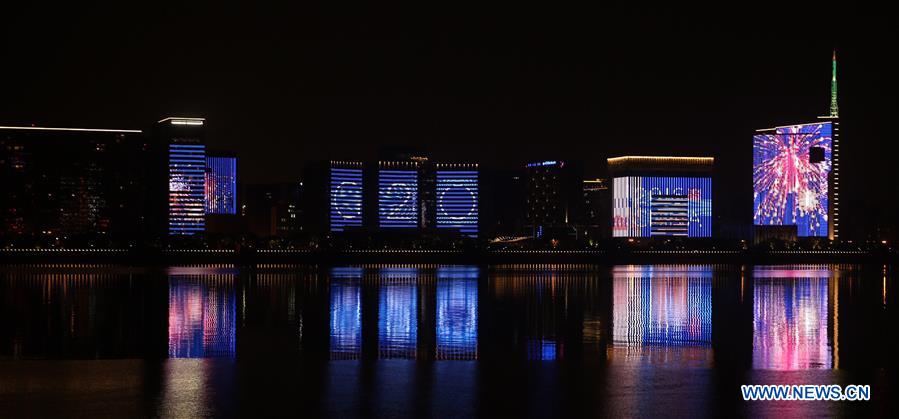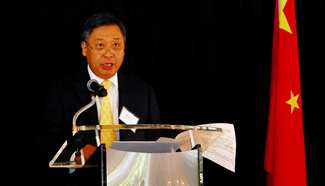
Photo taken on Aug. 31, 2016 shows a LED light show along the Qiantang River in Hangzhou, capital of east China's Zhejiang Province. The 11th G20 summit was held in Hangzhou from Sept. 4 to 5. (Xinhua/Jin Liwang)
BEIJING, Sept. 17 (Xinhua) -- As the world lauded the achievements of the G20 Hangzhou summit earlier this month in addressing a sluggish world economy, China's new approach to foreign affairs became evident: summit diplomacy.
G20 leaders at the summit agreed to set the course for the world economy, creating new paths for growth, modernizing the world economy, improving global governance, revitalizing international trade and investment and promoting inclusive development.
These achievements came after China's long-term appeals to focus on developing the world economy and reform the international financial system. China's ideas were widely included in the Leaders' Communique issued after the summit.
Such consensus is a positive result for the G20 and is typical of China's proactive approach in pursuing foreign policy through summits and leaders' meetings in recent years.
The G20 summit was a major diplomatic event held in China, as was the APEC leaders' meeting held in Beijing in 2014.
At the APEC meeting, China advocated connectivity and cross-border collaboration. China's efforts for free trade in the Pacific area became more than just a vision; they became practical goals.
China has also been active in other summits throughout the world. In 2015 alone, Chinese President Xi Jinping attended a series of UN summits, the Paris Climate Change Conference, the G20 summit in Turkey, the Asian-African Leaders' Meeting in Indonesia and the Forum on China-Africa Cooperation in South Africa.
Li Dongyan, a research fellow at the Chinese Academy of Social Sciences, said that such international meetings are playing an increasingly important role in addressing varying global issues.
As China gets stronger by participating in globalization, it is increasingly becoming more involved in global governance and shouldering more responsibility in addressing global challenges.
For this reason, playing a more important role in major global institutions is inevitable, Li said.
In March 2014 when addressing the Colbert Foundation in Germany, Xi said China will contribute a Chinese vision to the management of contemporary international relations, offering Chinese solutions to improve global governance, and work with international society to meet the various challenges of the 21st century.
In March this year, China's top legislature adopted the 13th Five-Year Plan (2016-2020), setting out the country's intention to "actively participate in global economic governance and to contribute to the provision of global public goods, increasing the power of dialogue in global economic governance."
Recent summits show that Chinese plans are becoming increasingly attractive to the international community, and China's capability to address global issues is improving.
Aside from China's contributions to the G20 Hangzhou summit and APEC Beijing meetings, its contributions to multilateral meetings are evident throughout the world.
Through the Forum on China-Africa Cooperation, China is helping African countries in poverty relief, public health, infrastructure construction and other development issues. As the world's largest developing country, China hopes to help the world use its considerable experience and achievements in economic development over nearly four decades.
Jin Canrong, a professor at Renmin University, said China has gradually changed its attitude toward multilateral diplomacy.
"We used to be skeptical toward multilateral venues because we were not familiar with them, and we were afraid of being bullied. What's more, we were poor and weak," Jin said.
Over the past decade, China has gradually formed a foreign policy that treats "major power relations as key, relations with neighboring countries as a top priority, relations with developing countries as a foundation, and multilateral diplomacy as an important arena."
As it gets stronger and wants to promote its ideas, China finds that many issues must be addressed with the joint efforts of the world, and multilateral meetings can better aid China in advocating its concepts.
In summits and leaders' meetings, especially as the host nation as with the G20 Hangzhou summit, China can set the theme and influence the outcome, Jin said.
China set the theme of the G20 Hangzhou summit as "Toward an Innovative, Invigorated, Interconnected and Inclusive World Economy," which was reflected in the summit's outcome.
"As China continues to merge into the global system, it will play a more active role in summits and other multilateral meetings," Jin said.
Related:
News Analysis: China's resolution gives hope to world economy
BEIJING, Sept. 6 (Xinhua) -- China's ambition to advance reform and maintain medium to high growth has injected hope and stability into the world economy, experts have observed.
Addressing the opening ceremony of the Business 20 summit in Hangzhou, Chinese President Xi Jinping reassured the world's business leaders that China can realize strong growth and would not backslide on structural reform and opening up.? Full story
Spotlight: Overseas analysts hail China's role in G20
BEIJING, Sept. 9 (Xinhua) -- Overseas China-watchers have hailed the country's active and more mature role in the Group of 20 (G20) by hosting a summit that highlighted innovation and cooperation to spur global economic growth.
The G20 summit concluded on Monday in the eastern Chinese city of Hangzhou with the adoption of a statement outlining the group's direction and development goals, and with the Hangzhou Consensus on facilitating global economic growth through innovative and inclusive long-term measures.? Full story











